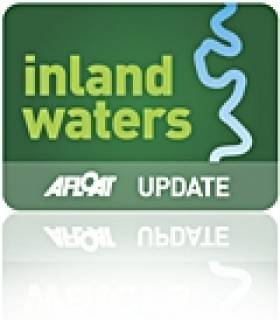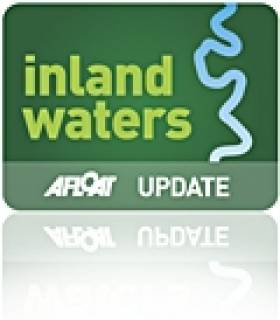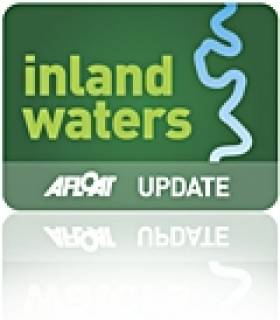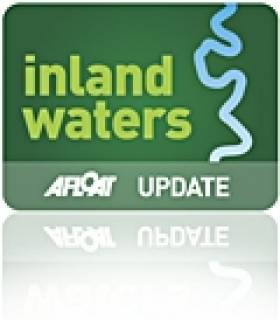Displaying items by tag: Sallins
Towpath Closure on Grand Canal in Sallins for Greenway Works
Waterways Ireland advises that the towpath on the south bank of the Grand Canal adjacent to Church Avenue in Sallins, Co Kildare will be closed from Tuesday 15 to Saturday 26 February.
This closure is to facilitate tree removal works for the new Grand Canal Greenway route, the cross-border body for Ireland’s inland waterways says. It follows a similar closure from Lucan to Hazelhatch that continues until this Sunday 6 February.
Underwater Obstruction at Grand Canal, Sallins
#underwaterobstruction – Waterways Ireland is advising Masters and owners of vessels that there is an underwater obstruction in the Grand Canal at Sallins adjacent to the newly constructed extended mooring berths West of Sallin's Bridge.
Master's of vessels should navigate with caution until clear of the obstruction.
Waterways Ireland says it apologises to its customers for this inconvenience.
Extended Term Serviced Moorings Open to Boaters in Sallins, Co Kildare
#moorings – Waterways Ireland intends to open the Extended Term Serviced Moorings in Sallins, Co Kildare in October 2014. The moorings in Sallins have been created with a number of services to provide a high standard of facility. The moorings have electricity, water, lighting and access to broadband, a sewage pumpout and rubbish disposal facilities.
Initial applications for berths in the Extended Term Serviced Moorings will open on 1 September 2014 for three weeks to boaters holding a Combined Mooring & Passage Permit (CMP).
To find more about the Extended Term Serviced Moorings contact Waterways Ireland or download the application form, criteria and guidelines from www.waterwaysireland.org; by Tel 0044 (0)28 6632 3004 and asking for a Extended Term Serviced Mooring Pack or by writing to ETS Mooring Application Pack, Waterways Ireland, 2 Sligo Rd, Enniskillen, BT74 7JY.
The Application Process requires the applicant to already hold a Combined Mooring & Passage Permit, complete the application form, and submit the enclosures and fees including a security deposit with the application by the 22nd September 2014. The Extended Term Serviced Mooring rate of €152 applies to these berths currently. Applicants are advised that the charging regime will be subject to change when new Bye-Laws come into force (currently at draft stage).
Evaluation of the applications will take place after the closing date. A license will be issued only on payment of the balance of the fee and the signing of a license agreement.
#InlandWaters - Waterways Ireland has confirmed that the construction project to develop houseboat mooring facilities for the Grand Canal in Sallins, Co Kildare has now recommenced on site.
It's now advised that as a consequence of the delay, which Waterways Ireland assures was unforeseen, the contract will now be completed in August.
Waterways Ireland says it "will ensure that the previous contractual difficulties do not result in any reduction in the quality or standard of the completed project.
"Waterways Ireland apologies to customers, residents and local businesses for any inconvenience caused by the unforeseen delay to the contract."
For further information please see Waterways Ireland's current Waterway Work Programmes.
Enquiries relating to the Sallins Houseboat Facility project are directed Waterways Ireland's on-site representative at 087 990 1935.
Moorings Upgrade at Sallins, Grand Canal
#grandcanal – Waterways Ireland is upgrading the moorings and services on the Grand Canal in Sallins, Co Kildare to create Houseboat Moorings to facilitate the boating customers in the area. The contract has been awarded and the work is expected to take place during the closed navigation season and be ready for the new boat season in 2014.
The 210m Houseboat Moorings are to be installed east of Sallins Bridge. The moorings will have electricity, water, lighting and access to a sewage pumpout and rubbish disposal facilities. The existing canal bank will also be landscaped with pathways designed in accordance with Waterways Ireland 'Access for All' standards. These moorings will be open to application from permanent boat residents holding a Combined Mooring and Passage Permit (CMP).
In addition to the Houseboat Moorings, an area for 240m of Extended Mooring west of Sallins Bridge is also being prepared where boat owners already in possession of a CMP will be able to apply for a 1 year mooring license –an Extended Mooring Permit.
A short term mooring for boats continuously cruising is also being installed east of Sallins Bridge. These moorings will have bollards providing water.
As the majority of the works to create the houseboat moorings will be undertaken from the water, boats currently moored there have been required to move. This phase has been completed and the contactor is currently preparing to move on site.
The Extended Moorings will be offered as a first option to those moving to facilitate the work. Boaters wishing to move to the Extended Moorings in Sallins are advised to complete the application online on www.waterwaysireland.org as soon as possible. Moorings will be allocated on a first come first served basis.
Waterways Ireland has met with Permit holders locally and is taking their concerns on board. Waterways Ireland will continue to liaise personally with Permit Holders and with the local community through the local press to ensure all are kept up to date with progress.

































































